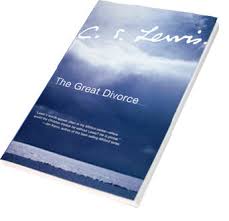The Great Divorce

"In The Great Divorce, C.S. Lewis' classic vision of the Afterworld, the narrator boards a bus on a drizzly English afternoon and embarks on an incredible voyage through Heaven and Hell. He meets a host of supernatural beings far removed from his expectations, and comes to some significant realizations about the nature of good and evil."
-- From the back cover
In case you are not familiar with C.S. Lewis or his biography, he was a professor of medieval and Renaissance literature at Oxford and Cambridge universities in the early-to-mid twentieth century. But he is best known as a former atheist who became one of the greatest spokespersons for the Christian faith in his generation.
-- From the back cover
Bringing his incredible mind and imagination to bear on the issues and arguments of his day, he consistently combined piercing insight and good humor in order to present the Christian worldview to an unbelieving world. As a testimony to his success, I might mention that my copy of The Great Divorce was given to me by an unbelieving friend who, upon discovering that I was a fan of Lewis, recommended this book because it had gotten him thinking about the Afterlife.
Lewis wrote The Great Divorce as a response to the worldview reflected in William Blake's Marriage of Heaven and Hell. In his preface, Lewis observes:
"In some sense or other the attempt to make that marriage is perennial. The attempt is based on the belief that reality never presents us with an absolutely unavoidable "either-or"; that, granted skill and patience and (above all) time enough, some way of embracing both alternatives can always be found; that mere development or adjustment or refinement will somehow turn evil into good without our being called on for a final and total rejection of anything we should like to retain. This belief I take to be a disastrous error. You cannot take all luggage with you on all journeys; on one journey even your right hand and your right eye may be among the things you have to leave behind."
Thus The Great Divorce speaks with tremendous relevance and potency to our postmodern mindset, in which all "truths" are like spokes on a wheel, terminating ultimately in the same hub of reality.
In typical Lewis style, this work is not a straight-forward theological essay, but rather a fanciful allegory which serves as a vehicle for Lewis' powerful truth claims. As the characters in the story gradually become aware, there is a bi-polar nature to truth, and therefore to redemption and damnation. There is a "great divorce" -- or, in biblical language, "a great gulf fixed" (Luke 16:26) -- between the two opposing and mutually exclusive possibilities for eternity. It is this basic principle, rather than any specific claims regarding the nature or makeup of heaven or hell, that Lewis is pressing upon his readers.
Nonetheless, the imagery of "solid people" (the inhabitants of heaven), who live in a land of overwhelmingly real and progressive joys, certainly will excite the Christian to happy anticipation of the glories to come for believers. And the true-to-life descriptions of "grey town" (hell), with its aching voids and continued self-deception, may very well provoke thoughtful contemplation -- as in the case of my friend -- about the nature of life (now and in eternity) without God.
In either case, this classic work is well worth the reading.